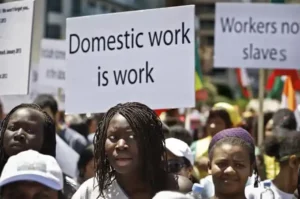Share
Labor migration is one of the main features of international migration. Many people leave their country due to economic inequalities and unemployment in the hope of finding better opportunities elsewhere. The international labor organization estimated 169 million International migrant workers across the globe. 75.6 million are domestic workers and 2.4 million are located in the Gulf region. Most of them are women who come from Africa and Asia. These domestic workers instead of working under the state’s law of labor found themselves working under a particular system called the “Kafala system” that removes the state’s guardianship and protection.
What is the “Kafala system”?
Kafala is a word in Arabic that refers to responsibility, guarantee, and taking care of another human being in multiple aspects of life such as finances, health, and housing. The Kafala or sponsorship system that took the same word but not the intention regulates the relationship between the employer and the migrant worker within the host country. The state is the one providing local employers with a sponsorship permit to attract non-citizens workers.
It is adopted by the GCC states members (Saudi Arabia, Kuwait, Bahrain, Oman, Qatar, and United Arab Emirates) but also Lebanon and Jordan. It was only after the oil boom in the 1950s that it became implemented as a form of work law. These countries needed a cheap international labor force to build their infrastructures and manage their homes as well. The migrant worker is recruited through a private recruitment agency who then links them with their potential employer. The kafil or the sponsor take care of the accommodations, travel expense, and housing of the worker.
This system gives the entire legal authority to the employer or “the kafil”, which starts with the detention of the passport of the migrant workers by the employer, which eventually leaves no freedom of mobility, changing jobs, or leaving the country without the employer’s agreement. In addition, the worker is no longer protected by the state’s labor law as the kafala system falls under the ministry of interior and the ministry of labor, which then creates a power imbalance and makes the employee more vulnerable and subject to potential abuse.
Who works under the “Kafala” system in the middle east region?
The system is intended for any labor migrants who seek work in one of the middle east states applying it. One of the reasons this system was introduced is to rapidly build strong and well-developed countries with a lowest cost, and to maintain the privileged status of the nationals in the economical equation. The system leaves no room for foreigners to have their own businesses or work without a sponsor. However, the majority of workers who are subjects to the kafala system works in sectors like construction, domestic work and services that are considered as undesired work for locals.
How is work conditions under “Kafala system”?
The kafala system was subject to many controversies since the emergence of testimonies of many domestic workers in the Gulf states and Lebanon exposing the abusive nature of the system. Many of these domestic workers reported that they were no longer treated as human beings, some didn’t have access to food, some were subject to physical, sexual, and psychological violence and others couldn’t quit their job fearing being deported or detained. In Kuwait, 2247 Nepali housemaids demanded aid from their embassy because of the abuse and exploitation they experienced during their work.
A report published in June 2021 by the International Organization for Migration on women domestic workers in Lebanon showed the conditions of work under the “Kafala system” which demonstrates the absence of protection and rights for these domestic migrant workers and questions the state’s accountability in allowing the system to exist in its actual format
Is reforming the “Kafala system” possible?
The International Labor Organization (ILO) has been focusing on finding ways to persuade states in the middle east that apply the “kafala system” to change it. In 2011, the ILO proposed a framework that aims in improving protection and work conditions for domestic workers
It has not been adopted by any of the state’s members of the Gulf Council Cooperation. However, some of these countries seem to make some effort concerning the system after its abusive side was exposed to the international community. In Saudi Arabia, permission from the employer is no longer required if the employee decides to leave the country after the end of the employment contract or to change a job. Qatar implemented a non-discriminatory minimum wage and created a worker aid and insurance fund
The states also limited the control the “kafil” or the sponsor has on the migrant worker by removing the requirement for workers to go through their employee to have an exit permit. Nevertheless, this reform remains very limited and excludes for example domestic workers, and taxi drivers, from having access to this type of protection.



Average Rating